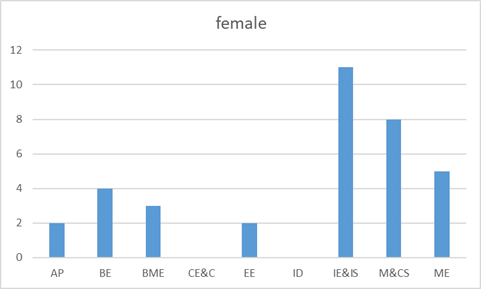![[Translate to English:]](/fileadmin/_processed_/d/b/csm_strooigoed3_Marc_Weikamp_c3fb13f656.jpg)
- The University , Research
- 07/05/2020
Strong increase in proportion of women scientists
In the space of ten months, TU/e has succeeded in recruiting 35 new women scientists under its Irène Curie Fellowship program. Most of these appointees are assistant professors and three-quarters come from abroad. With its eleven fellows, the most successful department has been that of Industrial Engineering & Innovation Sciences. Women now account for a quarter of TU/e's permanent academic staff. In four years' time that proportion will, it is hoped, have risen to 30 percent. The current crisis, however, could slow this progress, rector Frank Baaijens warns.
With the introduction of the Irène Curie Fellowship program, in July of last year TU/e took the step of opening each upcoming academic vacancy exclusively to women for the first six months of the recruitment period. Today, the Executive Board will announce how many new women scientists have been appointed thus far. In the great majority of cases, the successful applicant has been a scientist newly recruited to TU/e, says rector Frank Baaijens. In some cases a female postdoc at TU/e successfully applied for the position of assistant professor. “But since promotions fall outside the scope of the ICF program, a recruitment process was followed for all our new appointments,” says Baaijens.
Of the 35 new appointments, 29 are appointments to the position of assistant professor. In addition, women were appointed to two full professorships and two associate professorships. “For these last two categories of position, it is always difficult to find people,” says Baaijens. “Both men and women. It requires of the candidate the decision to move from one institution, where they have already built a career, to another. As far as opportunities for new assistant professors are concerned, some time ago our staffing policy was amended to provide more scope. An assistant professor will receive a permanent appointment within four years, provided the individual has the potential, in principle, to become at some later stage an associate professor and possibly a full professor. This change was made to ensure that in these positions, as in others, the proportion of women continues to increase in the coming years.”
Scouting
Baaijens says he is very pleased with the new group of scientists. “They are highly enthusiastic people, each and every one of them. And since we selected for quality, they bring a great deal of quality to TU/e. Many of them have come from our own network, or through networks such as ResearchGate. But we have also been actively scouting for talent. With the introduction of this program, as a university we are learning a great deal about scouting and how to recruit talent. This is an area that will assume greater importance in the coming years. Diversity at TU/e has been further boosted by having three-quarters of our new recruits come from abroad, a fact which doesn't surprise me at all, I have to say. And, indeed, greater diversity will in turn help us in our continued search for talent.”
Of all our departments Industrial Engineering & Innovation Sciences scored best, with their recruitment of eleven new women scientists over the past ten months. They were followed by Mathematics and Computer Science with eight fellows, and five at Mechanical Engineering. At the moment, no fellows have yet been appointed at Chemical Engineering and Chemistry and Industrial Design. Says Baaijens, “I should point out that only recently, in early 2019, Chemical Engineering and Chemistry appointed three women scientists. These appointments are not included in this overview because it runs from July of last year through to April of this year. In that period, Industrial Design had hardly any vacancies, but we have high hopes of seeing a couple of fellows appointed there before too long.”
Ongoing trend
Over the next four years the Board is keen to see the proportion of women scientists increase from 25 to 30 percent. “And we want to realize this across the various job categories and within all our departments,” says Baaijens. “At the start of the ICF program in July 2019 this proportion stood at 22.3 percent. It is now 25 percent. In ten months' time it has increased twice as fast as in the years prior. This is a huge leap forward.”
The exception clause, which permits departments to give preference to an exceptional male applicant, has been used twice. “In one case it involved a group where women were already firmly in the majority, and where they were actively looking to recruit a man,” says Baaijens. “Similarly, when recruiting scientists for the new Masters of Artificial Intelligence we will be accommodating should men be proposed; these are staff we need to find quickly because we are launching this particular master's in September.” According to Baaijens, deans can propose to him cases that are eligible for the exception clause. A small committee, comprising Ilja Voets, Panos Markopoulos and Ageeth Bol, will assess the proposal and advise him appropriately.
Broad base support
After ten months, does Baaijens have the impression that the ICF program has now developed broad base support within the university? “We sent out a survey on this topic to all full professors and associate professors. It revealed that a third of them remain critical of the program, and wonder whether alternative measures could have been used to increase the proportion of women. But more than 90 percent does expect that the ICF program will have the desired effect. In addition, 80 percent believes that it contributes positively to TU/e's branding.”
Friday Baaijens is expected at the Netherlands Institute for Human Rights in Utrecht to provide, for a second time, additional explanation about the ICF program. Last year this institute received a complaint of discrimination from antidiscrimination agency RADAR. During this second public hearing the institute will evaluate if the ICF program, with all its preconditions, is in propotion with the degree of underrepresentation of women in the scientific staff of the TU/e.

Discussion